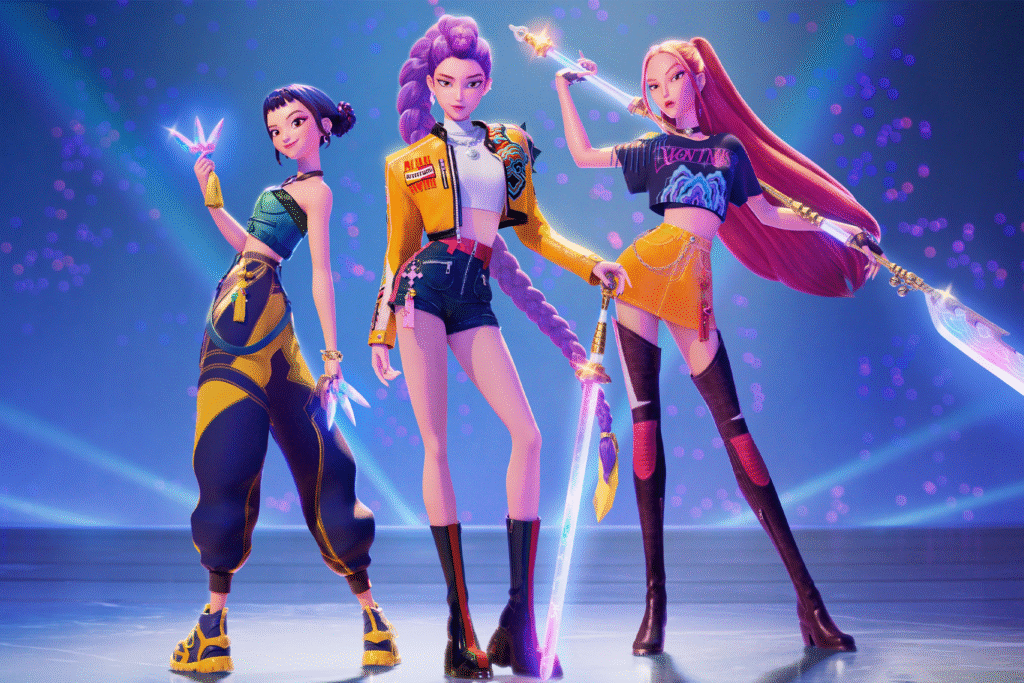At its core, KPop Demon Hunters follows the fictional girl group Huntr/x—Rumi, Mira, and Zoey—who balance their lives as K-pop superstars with secret identities as demon hunters. Voiced by Arden Cho, May Hong, and Ji-young Yoo, the trio battles a rival boy band, the Saja Boys, revealed to be demons in disguise. Directed by Maggie Kang and Chris Appelhans, the film weaves Korean mythology and demonology into a visually dazzling narrative, drawing from Kang’s vision to craft a story rooted in her heritage.
The film’s premise, blending high-energy K-pop performances with supernatural action, strikes a chord with diverse audiences. Critics have praised its infectious energy, with a 97% score on Rotten Tomatoes, calling it “charming, funny, and artfully punchy.” Viewers echo this enthusiasm, giving it a 91% audience score, drawn to its vibrant animation and relatable themes of identity and resilience. The New York Times noted its ability to deliver “jaunty family entertainment” without taking itself too seriously, making it a hit across age groups.
Soundtrack Success Shatters Records
The film’s soundtrack is a powerhouse, breaking records as the first to place four songs simultaneously in the Billboard Hot 100’s top 10. Tracks like “Golden,” performed by EJAE, AUDREY NUNA, and REI AMI, hit No. 1, marking the first time a K-pop girl group and an all-female trio topped the chart since Destiny’s Child in 2001. Other hits, including “Your Idol,” “Soda Pop,” and “How It’s Done,” have fueled over 3 billion global streams, with the soundtrack reaching No. 2 on the Billboard 200.
Featuring artists like TWICE’s Jeongyeon, Jihyo, and Chaeyoung, alongside producers like TEDDY and Jenna Andrews, the soundtrack captures the theatrical flair of K-pop. Ian Eisendrath, the executive music producer, emphasized its narrative role, telling Netflix Tudum that K-pop’s theatricality creates a “special musical and narrative experience.” The track “Golden” also made history as the first by an all-female group to top the Billboard Streaming Songs chart, surpassing Blackpink’s record for the highest-charting female K-pop act on U.S. Spotify.
Theatrical Triumph and Sing-Along Fever
Netflix capitalized on the film’s hype with a limited theatrical sing-along event on August 23 and 24, grossing $18 to $20 million across 1,700 theaters in North America. Over 1,300 screenings sold out in the U.S., Canada, Australia, New Zealand, and the UK, pushing the film to the top of the weekend box office—a first for a Netflix release. Surprise appearances by cast members like Arden Cho and Ken Jeong, alongside directors Kang and Appelhans, added to the excitement, delighting fans in New York and Los Angeles.
The sing-along version, now streaming on Netflix since August 25, lets fans belt out hits from the comfort of home. This move taps into the communal joy of K-pop fandom, where shared experiences amplify engagement. The film’s ability to transition from streaming to theaters and back underscores its cultural impact, with cinemas reportedly pleading for an extended run.
A Strategic Win for Netflix and Sony
Sony Pictures Animation, known for Spider-Man: Across the Spider-Verse, produced KPop Demon Hunters under a direct-to-platform deal with Netflix, covering the $100 million budget plus a $25 million fee. While Sony benefits from soundtrack and music publishing revenue, Netflix’s ownership of distribution rights ensures any sequel, like the increasingly likely KPop Demon Hunters 2, will remain exclusive to the platform. This arrangement, forged in 2021 during pandemic uncertainties, highlights Netflix’s knack for securing high-potential projects.
The film’s success challenges the notion that streaming originals can’t compete with theatrical releases. Its limited theatrical run not only boosted its visibility but also positioned it as a contender for awards, with Oscar buzz already circulating. By blending cultural authenticity with universal appeal, Netflix has crafted a blueprint for animated hits that resonate globally.
Why It Matters for Viewers
For fans, KPop Demon Hunters offers more than catchy tunes and stunning visuals. Its exploration of dual identities—pop stars by day, demon hunters by night—resonates with younger audiences navigating their own complexities. The film’s humor, including a standout scene where Huntr/x meets the Saja Boys, adds levity, while its subtle satire of K-pop culture and fandom appeals to older viewers. Reddit users have praised its balance, with one noting it captures “the joy I felt when first listening to K-pop.”
The film’s accessibility, streaming exclusively on Netflix, makes it easy for global audiences to dive in. Its vibrant aesthetics and non-cheesy songs appeal to both K-pop enthusiasts and newcomers, broadening its reach. For families, it’s a rare animated film that entertains kids with colorful action while offering adults sharp wit and cultural insights.
The Future of K-Pop Animation
The buzz around a potential sequel, fueled by fan demand and Sony’s negotiations with Kang and Appelhans, suggests KPop Demon Hunters could become a franchise. Social media posts on Reddit speculate about unresolved plot points, like Rumi’s quest to restore Jinu’s soul, hinting at rich storytelling potential. The film’s ability to blend K-pop’s global influence with animated storytelling positions it as a trailblazer, potentially inspiring more culturally rooted animated projects.
As Netflix continues to invest in original content, KPop Demon Hunters proves that niche concepts, when executed with authenticity and flair, can achieve universal success. Its record-breaking viewership and chart-topping soundtrack underscore the power of innovative storytelling, setting a high bar for the streaming giant’s future endeavors.
